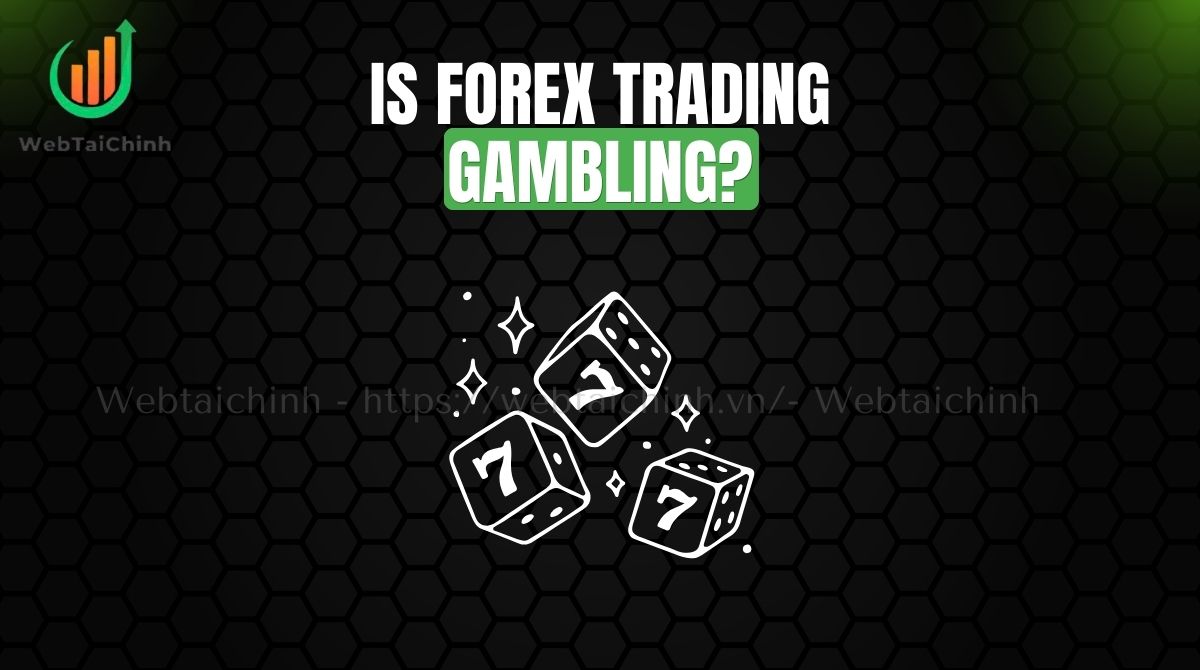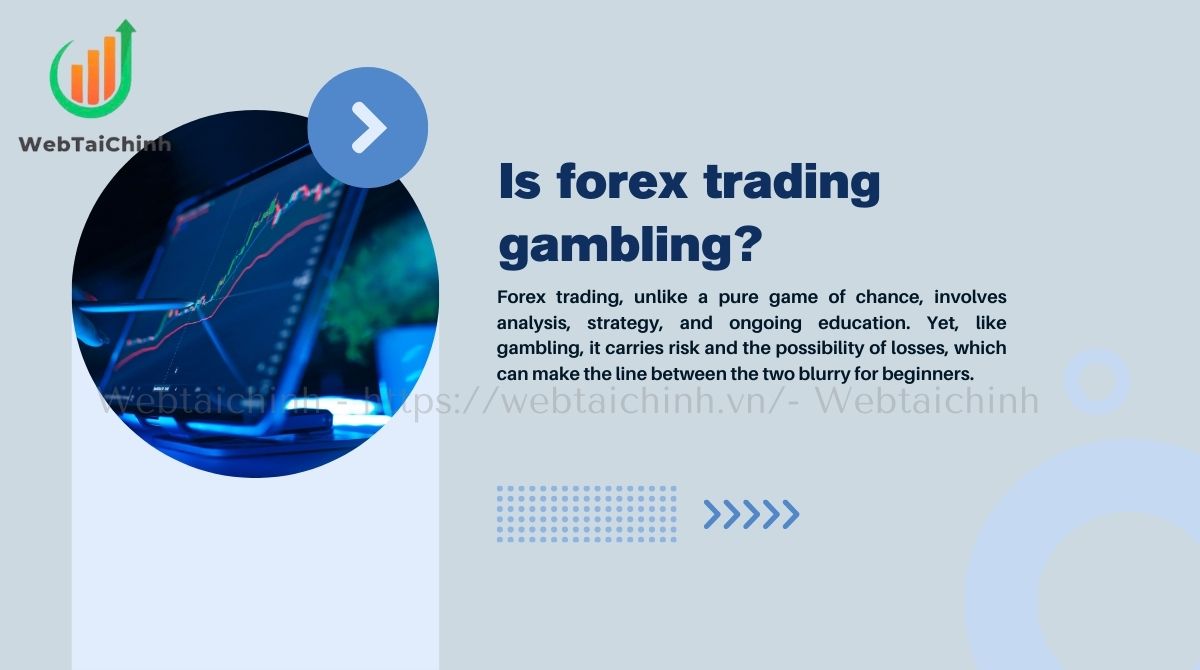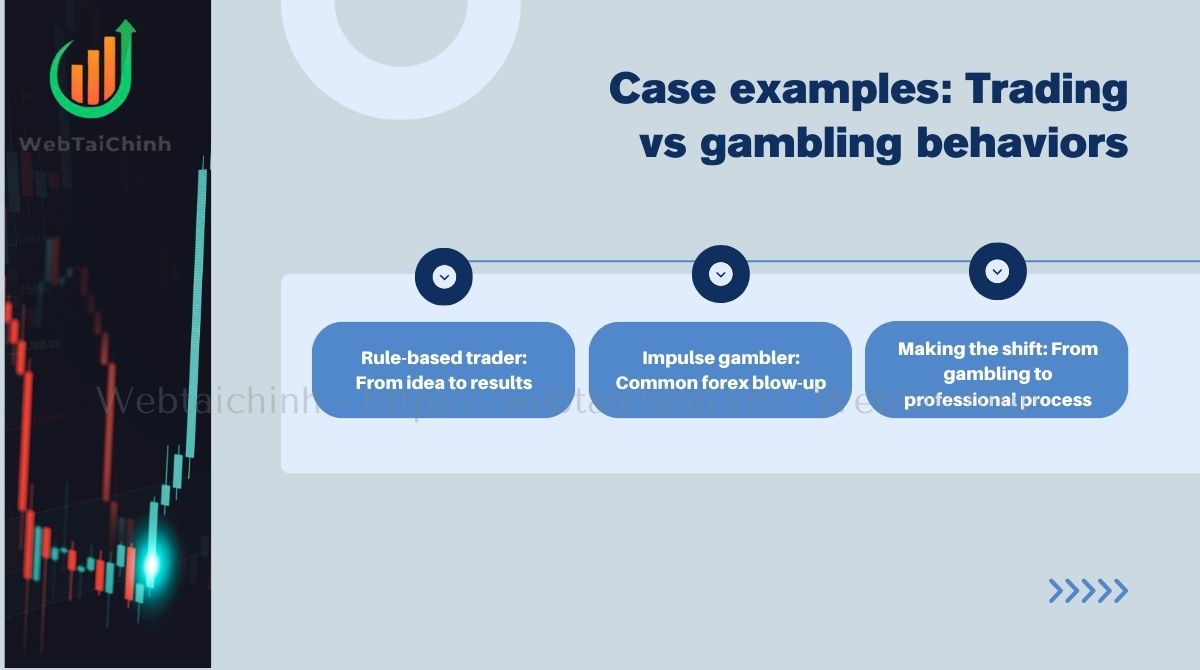Physical Address
304 North Cardinal St.
Dorchester Center, MA 02124
Physical Address
304 North Cardinal St.
Dorchester Center, MA 02124

When people first encounter the foreign exchange market, a common question arises: is forex trading gambling? At a glance, the risks, uncertainty, and potential for quick gains may resemble a casino game. However, the reality is more nuanced. Forex trading can be either a disciplined financial activity or pure speculation, depending on whether traders apply strategy, risk management, and education—or simply rely on luck.
Key takeaways:
Forex trading, unlike a pure game of chance, involves analysis, strategy, and ongoing education. Yet, like gambling, it carries risk and the possibility of losses, which can make the line between the two blurry for beginners. For instance, a novice trader placing bets on currency price moves without any research or risk control is very similar to a gambler spinning a roulette wheel.

Forex trading becomes gambling when a trader engages without a clear plan, lacks an edge, or ignores proper risk management. Conversely, when skill, discipline, and a tested system guide trading decisions, forex is a professional activity driven by informed speculation rather than chance.

Read more: What is buy limit in forex? Complete beginner’s guide
Regulatory summaries from organizations like the FCA emphasize that retail traders without strategies and risk parameters often face losses comparable to gambling. Industry analyses similarly stress the importance of system development to avoid random outcomes. This foundational verdict will guide our deeper exploration.
Understanding how forex trading differs from gambling involves examining five critical aspects: edge, skill, risk management, payout structures, and legitimacy. Each plays a role in tipping the balance between speculation as a profession or as pure chance.
In gambling, a “house edge” guarantees that casino operators hold a mathematical advantage over players. For example, roulette’s fixed odds ensure the house wins over time regardless of player skill.
Forex trading, however, contains no systemic house edge; any advantage (edge) must be created and maintained by the trader’s own strategies and market insight. This means forex participants strive for a repeatable statistical advantage through research and backtested systems rather than relying on luck.
Unlike most gambling, where luck dominates and skill has limited impact, forex trading rewards continuous learning and analytical ability. Traders use technical analysis—chart patterns, indicators, volume trends—and fundamental analysis such as macroeconomic data and geopolitical events. Mastery requires dedication, with many successful traders spending years refining their approach through backtesting and adapting to market conditions.
Risk management distinguishes forex trading from gambling emphatically. Tools like stop-loss orders, position sizing, and portfolio diversification help limit losses and protect capital in trading. Gambling often lacks these structured controls because bets are singular, and risk exposure is absolute. Consider risking 1% of capital per trade in forex versus placing an “all in” bet at a casino; the former preserves longevity, the latter rapidly magnifies risk.
Gambling offers fixed odds with predetermined payouts—win a hand or lose it all. Forex outcomes are probabilistic and variable, where a series of profitable trades can offset losses, enabling sustainable performance over time. This distribution-based structure means successful traders can achieve positive expectancy by balancing win rates with favorable risk-reward ratios, unlike gambling’s rigid fixed-odds system.
Forex trading operates within a highly regulated environment. Brokers are licensed and monitored by authorities such as the FCA (UK), ASIC (Australia), and CFTC (USA). Banks and corporations use FX markets extensively for hedging and operational needs, underscoring legitimacy beyond speculation.
Conversely, casinos and gambling operators are overseen by gambling commissions that regulate games of chance. This institutional difference reflects the fundamental variation in purpose and practice.
Forex trading crosses into gambling territory under certain common but avoidable circumstances:
According to the FCA’s annual reports, excessive leverage and lack of discipline contribute significantly to retail trader failures—aligning with behavioral finance studies on risk-taking and cognitive biases. Avoiding these pitfalls is essential for responsible trading.
Start by learning the fundamentals: understand how the forex market operates, major currency pairs (like EUR/USD, GBP/USD), trending versus ranging markets, and basic concepts of volatility and liquidity. Grasp risk assessment basics to know how much capital you can expose safely.
Develop a trading system by writing clear rules that specify which pairs to trade, entry and exit criteria, and risk parameters. Crucially, backtest your strategy on historical data and use demo accounts to practice without risking real capital.
Understand expectancy: a formula incorporating win rate and risk-reward ratio to predict long-term profitability. For example, a 45% win rate with a 1:2 reward-to-risk ratio implies positive expectancy, meaning your strategy should be profitable over time.
Establish strict rules such as risking only 0.5-1% per trade, setting daily loss limits, and maintaining maximum drawdown thresholds. Manage portfolio risk by considering currency correlations and diversifying exposure to avoid concentrated losses.
Use checklists, maintain a detailed trading journal, and set alarms to enforce discipline. Create a dedicated workspace that limits distractions and avoid making trades driven by emotion or impulsive reactions to news events.
Consider Sarah, who builds a strategy around major currency pairs guided by technical indicators. She backtests her approach for six months, stocks performance data, and adjusts when needed. Her consistency and discipline enable steady gains with controlled drawdowns.
John starts trading based on tips and hearsay without a plan. He chases losses by increasing trade size and trading frequency. After a few weeks, he blows up his account and quits frustrated, highlighting the dangers of gambling-like behavior.
After his losses, John educates himself, develops a tested plan, and begins tracking expectancy. Over several months, his consistency improves with lower drawdowns and better risk controls, demonstrating the transition from gambling mindset to disciplined trading.

Expectancy, calculated as (Win Rate × Average Win) − (Loss Rate × Average Loss), quantifies a strategy’s edge. In gambling, the house edge is a negative expectancy for players—for example, roulette’s bet on red has a win rate less than 50%, ensuring losses over time. In contrast, a trader with a 45% win rate but a 2:1 reward-to-risk ratio can expect positive returns.
This difference arises because trading returns are distributed variably and can be managed actively, whereas gambling outcomes are fixed and passive. Visual models of outcomes show that sustainable profitability in trading depends on managing this distribution intelligently.
| Criteria | Forex trading | Gambling |
| House edge | None/systemic; depends on trader’s edge | Always present |
| Skill/Analysis | Crucial, develops over time | Minimal, mostly luck |
| Risk management | Available, essential | Rare, not structured |
| Outcome structure | Variable, probabilistic | Fixed odds |
| Long-term winner | Skilled participants | The house |
| Regulation | Financial authorities | Gambling commissions |
Read more:
Not necessarily. If day trading is done with a tested strategy, proper risk management, and discipline, it is a professional activity rather than gambling. Without these, it can resemble gambling.
Yes, forex trading is legal in most countries, regulated by financial authorities to protect consumers and ensure market integrity.
It can be, but consistent profitability requires extensive education, testing, and disciplined risk management—it’s not a guaranteed or easy income.
Moderate leverage (typically 1:10 or less) is safer for retail traders, helping manage risk and avoid large losses. Excessive leverage increases the risk of blowing up accounts quickly.
By backtesting your strategy for positive expectancy over many trades and consistently measuring performance metrics like win rate, risk-reward ratio, and drawdowns.
Realistic returns depend on market conditions and skill but often range between 10-20% annually for disciplined traders; extremely high promises may involve undue risk.
So, is forex trading gambling? The answer depends on the mindset and methods applied. Without a plan, it mirrors the unpredictability of chance. But with skill, strategy, and discipline, forex becomes a structured and professional endeavor. For readers seeking deeper insights into trading, markets, and financial education, Webtaichinh provides trusted resources to guide you toward informed decisions.
Web Tai Chinh is a portal that updates news and information related to finance quickly and accurately, helping users have an overview before investing, clearly understanding concepts and terms related to Finance. Explore more insights in our Forex category, start your FX trading journey today with the right partner for long-term success.
📞 Contact: 055 937 9204
✉️ Email: webtaichinhvnvn@gmail.com
📍 Address: 13 Ho Tung Mau, An Binh, Di An, Binh Duong